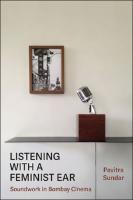Listening with a Feminist Ear
External Review of Whole Manuscript
Soundwork in Bombay Cinema
Abstract
Listening with a Feminist Ear is a study of the cultural politics and possibilities of sound in cinema. Eschewing ocularcentric and siloed disciplinary formations, the book takes seriously the radical theoretical and methodological potential of listening. It models a feminist interpretive practice that is not just attuned to how power and privilege are materialized in sound, but that engenders new, counter-hegemonic imaginaries.
Focusing on mainstream Bombay cinema, Sundar identifies singing, listening, and speaking as key sites in which gendered notions of identity and difference take form. Charting new paths through seven decades of film, media, and cultural history, Sundar identifies key shifts in women’s playback voices and the Islamicate genre of the qawwali. She also conceptualizes spoken language as sound, and turns up the volume on a capacious, multilingual politics of belonging that scholarly and popular accounts of nation typically render silent. All in all, Listening with a Feminist Ear offers a critical sonic sensibility that reinvigorates debates about the gendering of voice and body in cinema, and the role of sound and media in conjuring community.
Keywords
accent, audiovisual contract, aural lag, Bambaiyya, body, Bollywood, Bombay cinema, cinephilia, classic qawwali, communal, cultural politics, dargah qawwali, dialogue, feminist ear, gangster genre, gender, Hindi cinema, India, inter-aural, Islamicate, item number, liberalization, language, listening, listening public, media, millennial soundwork, music, musical, musicking, nation, playback, qawwali, regional, religion, romance, sexuality, singing, somatic clause, song sequences, sound, soundtrack, soundwork, speaking, speech, Sufipop, tapori, television, voice, voicing, xenophoneDOI
10.3998/mpub.11713921ISBN
9780472132485, 9780472039371, 9780472903665Publisher
University of Michigan PressPublisher website
https://www.press.umich.edu/Publication date and place
2023Classification
Music
Theory of music and musicology
Films, cinema
Television


 Download
Download